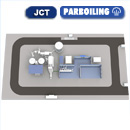Rice, a staple food in many cultures around the world, undergoes a remarkable journey before it reaches our plates. At the heart of this transformative process lies the rice mill plant, a marvel of modern engineering that plays a crucial role in refining and enhancing the quality of rice. In this article, we will take a closer look at the intricate workings of a rice mill plant and explore the various stages involved in the pinnacle of rice processing. Join us on a journey through the fascinating world of rice milling, where precision meets tradition to deliver the perfect grain.
Introduction: Unveiling the Key Components of a Modern Rice Mill Plant
Have you ever wondered what goes on behind the scenes in a rice mill plant? Today, we're going to dive deep into the world of rice processing and explore the key components that make up a modern rice mill plant. From the cleaning process to the final packaging stage, every step is crucial in ensuring that the rice we consume is of the highest quality.
Let's start by looking at the primary components of a rice mill plant. These include the cleaning machine, husking machine, whitening machine, polishing machine, grading machine, and packaging machine. Each of these machines plays a vital role in the overall processing of rice, transforming raw paddy into the polished grains we see on our plates. As we delve deeper into each component, you'll gain a greater appreciation for the precision and technology that goes into producing the rice we enjoy on a daily basis.
Efficiency at its Finest: Maximizing Output and Minimizing Waste in Rice Processing
In the complex world of rice processing, achieving maximum efficiency is the key to success. One integral component of this process is the rice mill plant. This marvel of engineering is designed to streamline the entire production process, from cleaning and husking the rice grains to polishing and packaging the final product.
Equipped with state-of-the-art machinery and advanced automation systems, the rice mill plant is able to handle large quantities of rice with precision and speed. By optimizing the use of resources and minimizing waste, this facility ensures that every grain of rice processed reaches its full potential. With a focus on quality control and sustainability, the rice mill plant stands as a shining example of efficiency at its finest in the world of rice processing.
Advanced Technology Integration: Enhancing Quality Control and Precision in Milling
In the world of rice processing, the integration of advanced technology has revolutionized the way rice milling plants operate. With cutting-edge machinery and equipment, quality control and precision have reached new heights, ensuring every grain of rice that passes through the mill is of the highest standard. The use of state-of-the-art sensors, monitoring systems, and automation has streamlined the milling process, eliminating human error and maximizing efficiency.
One key component of the modern rice mill plant is the incorporation of advanced sorting and grading systems. These systems utilize sophisticated algorithms and artificial intelligence to accurately separate rice grains based on size, shape, and quality. Through the implementation of such technology, mill operators can guarantee uniformity in their final product, meeting the demands of consumers for premium quality rice. The result is a rice mill plant that stands at the pinnacle of rice processing, setting new standards for excellence in the industry.
Best Practices for Optimal Maintenance and Upkeep of a Rice Mill Plant
When it comes to maintaining and running a rice mill plant efficiently, there are several best practices that can ensure optimal performance and longevity of the equipment. Regular cleaning and inspection of all machinery is paramount to prevent breakdowns and extend the lifespan of the plant. Implementing a strict schedule for maintenance tasks such as lubrication, belt tightening, and blade sharpening will help keep the plant running smoothly.
Another key aspect of maintaining a rice mill plant is to monitor and control the moisture content of the rice grains throughout the processing stages. Ensuring the correct moisture levels will not only improve the quality of the final product but also prevent damage to the machinery. Additionally, investing in quality spare parts and keeping an inventory of essential components on hand will minimize downtime in case of unexpected repairs. By following these best practices, operators can achieve the pinnacle of rice processing efficiency and productivity.
In Conclusion
In conclusion, the rice mill plant stands as a testament to the ingenuity and innovation of modern agriculture. Its efficiency, precision, and commitment to quality make it the pinnacle of rice processing technology. As we continue to advance in our understanding of rice cultivation and production, the rice mill plant serves as a shining example of what is possible when science and industry come together. So the next time you enjoy a delicious plate of rice, take a moment to appreciate the incredible journey it took to get there, starting from the fields all the way to the state-of-the-art rice mill plant.

